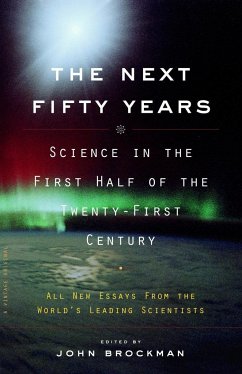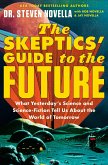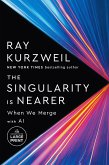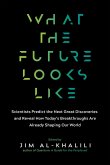The Next Fifty Years
Science in the First Half of the Twenty-First Century
Herausgeber: Brockman, John
The Next Fifty Years
Science in the First Half of the Twenty-First Century
Herausgeber: Brockman, John
- Broschiertes Buch
- Merkliste
- Auf die Merkliste
- Bewerten Bewerten
- Teilen
- Produkt teilen
- Produkterinnerung
- Produkterinnerung
A brilliant ensemble of the world's most visionary scientists provides twenty-five original never-before-published essays about the advances in science and technology that we may see within our lifetimes. Theoretical physicist and bestselling author Paul Davies examines the likelihood that by the year 2050 we will be able to establish a continuing human presence on Mars. Psychologist Mihaly Csikszentmihalyi investigates the ramifications of engineering high-IQ, geneticially happy babies. Psychiatrist Nancy Etcoff explains current research into the creation of emotion-sensing jewelry that could…mehr
Andere Kunden interessierten sich auch für
![The Skeptics' Guide to the Future The Skeptics' Guide to the Future]() Steven NovellaThe Skeptics' Guide to the Future18,99 €
Steven NovellaThe Skeptics' Guide to the Future18,99 €![The Singularity Is Nearer The Singularity Is Nearer]() Ray KurzweilThe Singularity Is Nearer31,99 €
Ray KurzweilThe Singularity Is Nearer31,99 €![What the Future Looks Like What the Future Looks Like]() What the Future Looks Like14,99 €
What the Future Looks Like14,99 €![Of Men and Galaxies Of Men and Galaxies]() Fred HoyleOf Men and Galaxies15,99 €
Fred HoyleOf Men and Galaxies15,99 €
A brilliant ensemble of the world's most visionary scientists provides twenty-five original never-before-published essays about the advances in science and technology that we may see within our lifetimes. Theoretical physicist and bestselling author Paul Davies examines the likelihood that by the year 2050 we will be able to establish a continuing human presence on Mars. Psychologist Mihaly Csikszentmihalyi investigates the ramifications of engineering high-IQ, geneticially happy babies. Psychiatrist Nancy Etcoff explains current research into the creation of emotion-sensing jewelry that could gauge our moods and tell us when to take an anti-depressant pill. And evolutionary biologist Richard Dawkins explores the probability that we will soon be able to obtain a genome printout that predicts our natural end for the same cost as a chest x-ray. (Will we want to read it? And will insurance companies and governments have access to it?) This fascinating and unprecedented book explores not only the practical possibilities of the near future, but also the social and political ramifications of the developments of the strange new world to come. Also includes original essays by: Lee Smolin Martin Rees Ian Stewart Brian Goodwin Marc D. Hauser Alison Gopnik Paul Bloom Geoffrey Miller Robert M. Sapolsky Steven Strogatz Stuart Kauffman John H. Holland Rodney Brooks Peter Atkins Roger C. Schank Jaron Lanier David Gelernter Joseph LeDoux Judith Rich Harris Samuel Barondes Paul W. Ewald
Produktdetails
- Produktdetails
- Verlag: Knopf Doubleday Publishing Group
- Seitenzahl: 320
- Erscheinungstermin: 14. Mai 2002
- Englisch
- Abmessung: 201mm x 130mm x 20mm
- Gewicht: 249g
- ISBN-13: 9780375713422
- ISBN-10: 0375713425
- Artikelnr.: 21862276
- Herstellerkennzeichnung
- Libri GmbH
- Europaallee 1
- 36244 Bad Hersfeld
- gpsr@libri.de
- Verlag: Knopf Doubleday Publishing Group
- Seitenzahl: 320
- Erscheinungstermin: 14. Mai 2002
- Englisch
- Abmessung: 201mm x 130mm x 20mm
- Gewicht: 249g
- ISBN-13: 9780375713422
- ISBN-10: 0375713425
- Artikelnr.: 21862276
- Herstellerkennzeichnung
- Libri GmbH
- Europaallee 1
- 36244 Bad Hersfeld
- gpsr@libri.de
Edited by John Brockman
Introduction: by John Brockman
###
Part I: The Future, in Theory
###
[p.xx]
Lee Smolin: The Future of the Nature of the Universe
"We will probably know more about the detailed history and
properties of the universe than we know now about the history of
the surface of our planet."
###
[p. xx]
Martin Rees: Cosmological Challenges: Are We Alone, and Where?
"We can't predict what role life will eventually carve out for itself: It
could become extinct, or it could achieve such dominance that it would
influence the entire cosmos."
###
[p. xx]
Ian Stewart: The Mathematics of 2050
"There will be `virtual unreality' systems, allowing mathematicians to
`visit' abstract conceptual structures such as non-euclidean geometries or
ranges of giant primes and manipulate them at will."
###
[p. xx]
Brian Goodwin: In the Shadow of Culture
"Why is animism so threatening to the Western scientific worldview? Is
there any sign that the dialectic of science is beginning to bring this
view into the light again?"
###
[p. xx]
Marc D. Hauser: Swappable Minds
"Imagine that we could download the neuronal signals from any animal,
creating a kind of hard-drive library of their thoughts while they were
interacting with the world."
###
[p. xx]
Alison Gopnik: What Children Will Teach Scientists
"The greatest achievement of a unified theory of learning may be to
demonstrate that the most brilliant scientists and the most ordinary kids
are engaged in the same enterprise."
###
[p. xx]
Paul Bloom: Toward a Theory of Moral Development
"It may be that the nature of moral thought or consciousness is simply
beyond our understanding, not because they have a special, mystical status
but because we aren't smart enough to understand such things. We might be
like dogs trying to understand calculus."
###
[p. xx]
Geoffrey Miller: The Science of Subtlety
"Our more recently evolved, distinctively human capacities--for creativity,
kindness, humor, imagination--remain understudied in brain-imaging labs."
###
[p. xx]
Mihaly Csikszentmihalyi: The Future of Happiness
"In the past, we were like passengers on the slow coach of evolution. Now
evolution is more like a rocket hurtling through space, and we are no
longer passengers but its pilots."
###
[p. xx]
Robert M. Sapolsky: Will We Still Be Sad Fifty Years from Now?
"Our technology isn't likely to help reduce our stress, despite (or maybe
even because of) our expectation that it will."
###
[p. xx]
Steven Strogatz: Fermi's "Little Discovery" and the Future of Chaos and
Complexity Theory
"Nonlinearity giveth chaos, and nonlinearity taketh it away."
###
[p. xx]
Stuart Kauffman: What Is Life?
"The biosphere may actually be doing something that cannot be stated at all
beforehand. If so, the way Newton, Einstein, Bohr, and Boltzmann taught us
to do science is limited."
###
Part II: The Future, in Practice
###
[p. xx]
Richard Dawkins: Son of Moore's Law
"Genetics today is pure information technology. This, precisely, is why an
antifreeze gene can be copied from an arctic fish and pasted into a
tomato."
###
[p. xx]
Paul Davies: Was There a Second Genesis?
"The existence of complex life on Earth probably depends on certain rather
special features of our solar system."
###
[p. xx]
John H. Holland: What Is to Come and How to Predict It
"When complex adaptive systems are involved, prediction is fraught with
hazard."
###
[p. xx]
Rodney Brooks: The Merger of Flesh and Machines
"The generalization we are facing is that we humans are machines--and as
such, subject to the same technological manipulations we routinely apply to
machines."
###
[p. xx]
Peter Atkins: The Future of Matter
"By mid-century the bits and pieces of fully synthetic life will be in
position....In the longer term there will be no need to stick with carbon,
and the speculative dream of at least partial incorporation of silicon and
germanium into living things and the generation of an entirely new kind of
life will come true."
###
[p. xx]
Roger C. Schank: Are We Going to Get Smarter?
"We will begin to understand in the next fifty years that experience and
one's ability to extend its range is the ultimate measure of intelligence
and the ultimate expression of freedom."
###
[p. xx]
Jaron Lanier: The Complexity Ceiling
"Accompanying the parade of quixotic overstatements of theoretical computer
power has been a humiliating and unending sequence of disappointments in
the performance of real information systems."
###
[p. xx]
David Gelernter: Tapping into the Beam
"The continuous, ubiquitous Cybersphere will replace today's chaotic,
stuttering Internet."
###
[p. xx]
Joseph LeDoux: Mind, Brain, and Self
"New technologies are enabling us to study normal human brain function, and
they promise a new level of understanding of the relation of the human
brain to the human mind."
###
[p. xx]
Judith Rich Harris: What Makes Us the Way We Are: The View from 2050
"Developmentalists of the twentieth century...thought they understood the
sources of individual differences in behavior and personality, but...they
were mostly wrong."
###
[p. xx]
Samuel Barondes: Drugs, DNA, and the Analyst's Couch
"Fifty years from now, everyone who visits a psychiatrist will bring with
them a new source of information--a password providing access to their
personal DNA file on the National Health Service computer."
###
[p. xx]
Nancy Etcoff: Brains, Wearables, and Brief Encounters
"At a time of giddy optimism in the neurosciences, it is a time of
discontent in psychiatry and wary optimism in clinical psychology. If
current trends continue, there will be few psychiatrists in practice fifty
years from now."
###
[p. xx]
Paul W. Ewald: Mastering Disease
"Chronic diseases may be a consequence of infectious agents that
cryptically cause tissue damage, which eventually manifests itself in such
serious diseases as heart attack, cancer, or Alzheimer's."
###
Part I: The Future, in Theory
###
[p.xx]
Lee Smolin: The Future of the Nature of the Universe
"We will probably know more about the detailed history and
properties of the universe than we know now about the history of
the surface of our planet."
###
[p. xx]
Martin Rees: Cosmological Challenges: Are We Alone, and Where?
"We can't predict what role life will eventually carve out for itself: It
could become extinct, or it could achieve such dominance that it would
influence the entire cosmos."
###
[p. xx]
Ian Stewart: The Mathematics of 2050
"There will be `virtual unreality' systems, allowing mathematicians to
`visit' abstract conceptual structures such as non-euclidean geometries or
ranges of giant primes and manipulate them at will."
###
[p. xx]
Brian Goodwin: In the Shadow of Culture
"Why is animism so threatening to the Western scientific worldview? Is
there any sign that the dialectic of science is beginning to bring this
view into the light again?"
###
[p. xx]
Marc D. Hauser: Swappable Minds
"Imagine that we could download the neuronal signals from any animal,
creating a kind of hard-drive library of their thoughts while they were
interacting with the world."
###
[p. xx]
Alison Gopnik: What Children Will Teach Scientists
"The greatest achievement of a unified theory of learning may be to
demonstrate that the most brilliant scientists and the most ordinary kids
are engaged in the same enterprise."
###
[p. xx]
Paul Bloom: Toward a Theory of Moral Development
"It may be that the nature of moral thought or consciousness is simply
beyond our understanding, not because they have a special, mystical status
but because we aren't smart enough to understand such things. We might be
like dogs trying to understand calculus."
###
[p. xx]
Geoffrey Miller: The Science of Subtlety
"Our more recently evolved, distinctively human capacities--for creativity,
kindness, humor, imagination--remain understudied in brain-imaging labs."
###
[p. xx]
Mihaly Csikszentmihalyi: The Future of Happiness
"In the past, we were like passengers on the slow coach of evolution. Now
evolution is more like a rocket hurtling through space, and we are no
longer passengers but its pilots."
###
[p. xx]
Robert M. Sapolsky: Will We Still Be Sad Fifty Years from Now?
"Our technology isn't likely to help reduce our stress, despite (or maybe
even because of) our expectation that it will."
###
[p. xx]
Steven Strogatz: Fermi's "Little Discovery" and the Future of Chaos and
Complexity Theory
"Nonlinearity giveth chaos, and nonlinearity taketh it away."
###
[p. xx]
Stuart Kauffman: What Is Life?
"The biosphere may actually be doing something that cannot be stated at all
beforehand. If so, the way Newton, Einstein, Bohr, and Boltzmann taught us
to do science is limited."
###
Part II: The Future, in Practice
###
[p. xx]
Richard Dawkins: Son of Moore's Law
"Genetics today is pure information technology. This, precisely, is why an
antifreeze gene can be copied from an arctic fish and pasted into a
tomato."
###
[p. xx]
Paul Davies: Was There a Second Genesis?
"The existence of complex life on Earth probably depends on certain rather
special features of our solar system."
###
[p. xx]
John H. Holland: What Is to Come and How to Predict It
"When complex adaptive systems are involved, prediction is fraught with
hazard."
###
[p. xx]
Rodney Brooks: The Merger of Flesh and Machines
"The generalization we are facing is that we humans are machines--and as
such, subject to the same technological manipulations we routinely apply to
machines."
###
[p. xx]
Peter Atkins: The Future of Matter
"By mid-century the bits and pieces of fully synthetic life will be in
position....In the longer term there will be no need to stick with carbon,
and the speculative dream of at least partial incorporation of silicon and
germanium into living things and the generation of an entirely new kind of
life will come true."
###
[p. xx]
Roger C. Schank: Are We Going to Get Smarter?
"We will begin to understand in the next fifty years that experience and
one's ability to extend its range is the ultimate measure of intelligence
and the ultimate expression of freedom."
###
[p. xx]
Jaron Lanier: The Complexity Ceiling
"Accompanying the parade of quixotic overstatements of theoretical computer
power has been a humiliating and unending sequence of disappointments in
the performance of real information systems."
###
[p. xx]
David Gelernter: Tapping into the Beam
"The continuous, ubiquitous Cybersphere will replace today's chaotic,
stuttering Internet."
###
[p. xx]
Joseph LeDoux: Mind, Brain, and Self
"New technologies are enabling us to study normal human brain function, and
they promise a new level of understanding of the relation of the human
brain to the human mind."
###
[p. xx]
Judith Rich Harris: What Makes Us the Way We Are: The View from 2050
"Developmentalists of the twentieth century...thought they understood the
sources of individual differences in behavior and personality, but...they
were mostly wrong."
###
[p. xx]
Samuel Barondes: Drugs, DNA, and the Analyst's Couch
"Fifty years from now, everyone who visits a psychiatrist will bring with
them a new source of information--a password providing access to their
personal DNA file on the National Health Service computer."
###
[p. xx]
Nancy Etcoff: Brains, Wearables, and Brief Encounters
"At a time of giddy optimism in the neurosciences, it is a time of
discontent in psychiatry and wary optimism in clinical psychology. If
current trends continue, there will be few psychiatrists in practice fifty
years from now."
###
[p. xx]
Paul W. Ewald: Mastering Disease
"Chronic diseases may be a consequence of infectious agents that
cryptically cause tissue damage, which eventually manifests itself in such
serious diseases as heart attack, cancer, or Alzheimer's."
Introduction: by John Brockman
###
Part I: The Future, in Theory
###
[p.xx]
Lee Smolin: The Future of the Nature of the Universe
"We will probably know more about the detailed history and
properties of the universe than we know now about the history of
the surface of our planet."
###
[p. xx]
Martin Rees: Cosmological Challenges: Are We Alone, and Where?
"We can't predict what role life will eventually carve out for itself: It
could become extinct, or it could achieve such dominance that it would
influence the entire cosmos."
###
[p. xx]
Ian Stewart: The Mathematics of 2050
"There will be `virtual unreality' systems, allowing mathematicians to
`visit' abstract conceptual structures such as non-euclidean geometries or
ranges of giant primes and manipulate them at will."
###
[p. xx]
Brian Goodwin: In the Shadow of Culture
"Why is animism so threatening to the Western scientific worldview? Is
there any sign that the dialectic of science is beginning to bring this
view into the light again?"
###
[p. xx]
Marc D. Hauser: Swappable Minds
"Imagine that we could download the neuronal signals from any animal,
creating a kind of hard-drive library of their thoughts while they were
interacting with the world."
###
[p. xx]
Alison Gopnik: What Children Will Teach Scientists
"The greatest achievement of a unified theory of learning may be to
demonstrate that the most brilliant scientists and the most ordinary kids
are engaged in the same enterprise."
###
[p. xx]
Paul Bloom: Toward a Theory of Moral Development
"It may be that the nature of moral thought or consciousness is simply
beyond our understanding, not because they have a special, mystical status
but because we aren't smart enough to understand such things. We might be
like dogs trying to understand calculus."
###
[p. xx]
Geoffrey Miller: The Science of Subtlety
"Our more recently evolved, distinctively human capacities--for creativity,
kindness, humor, imagination--remain understudied in brain-imaging labs."
###
[p. xx]
Mihaly Csikszentmihalyi: The Future of Happiness
"In the past, we were like passengers on the slow coach of evolution. Now
evolution is more like a rocket hurtling through space, and we are no
longer passengers but its pilots."
###
[p. xx]
Robert M. Sapolsky: Will We Still Be Sad Fifty Years from Now?
"Our technology isn't likely to help reduce our stress, despite (or maybe
even because of) our expectation that it will."
###
[p. xx]
Steven Strogatz: Fermi's "Little Discovery" and the Future of Chaos and
Complexity Theory
"Nonlinearity giveth chaos, and nonlinearity taketh it away."
###
[p. xx]
Stuart Kauffman: What Is Life?
"The biosphere may actually be doing something that cannot be stated at all
beforehand. If so, the way Newton, Einstein, Bohr, and Boltzmann taught us
to do science is limited."
###
Part II: The Future, in Practice
###
[p. xx]
Richard Dawkins: Son of Moore's Law
"Genetics today is pure information technology. This, precisely, is why an
antifreeze gene can be copied from an arctic fish and pasted into a
tomato."
###
[p. xx]
Paul Davies: Was There a Second Genesis?
"The existence of complex life on Earth probably depends on certain rather
special features of our solar system."
###
[p. xx]
John H. Holland: What Is to Come and How to Predict It
"When complex adaptive systems are involved, prediction is fraught with
hazard."
###
[p. xx]
Rodney Brooks: The Merger of Flesh and Machines
"The generalization we are facing is that we humans are machines--and as
such, subject to the same technological manipulations we routinely apply to
machines."
###
[p. xx]
Peter Atkins: The Future of Matter
"By mid-century the bits and pieces of fully synthetic life will be in
position....In the longer term there will be no need to stick with carbon,
and the speculative dream of at least partial incorporation of silicon and
germanium into living things and the generation of an entirely new kind of
life will come true."
###
[p. xx]
Roger C. Schank: Are We Going to Get Smarter?
"We will begin to understand in the next fifty years that experience and
one's ability to extend its range is the ultimate measure of intelligence
and the ultimate expression of freedom."
###
[p. xx]
Jaron Lanier: The Complexity Ceiling
"Accompanying the parade of quixotic overstatements of theoretical computer
power has been a humiliating and unending sequence of disappointments in
the performance of real information systems."
###
[p. xx]
David Gelernter: Tapping into the Beam
"The continuous, ubiquitous Cybersphere will replace today's chaotic,
stuttering Internet."
###
[p. xx]
Joseph LeDoux: Mind, Brain, and Self
"New technologies are enabling us to study normal human brain function, and
they promise a new level of understanding of the relation of the human
brain to the human mind."
###
[p. xx]
Judith Rich Harris: What Makes Us the Way We Are: The View from 2050
"Developmentalists of the twentieth century...thought they understood the
sources of individual differences in behavior and personality, but...they
were mostly wrong."
###
[p. xx]
Samuel Barondes: Drugs, DNA, and the Analyst's Couch
"Fifty years from now, everyone who visits a psychiatrist will bring with
them a new source of information--a password providing access to their
personal DNA file on the National Health Service computer."
###
[p. xx]
Nancy Etcoff: Brains, Wearables, and Brief Encounters
"At a time of giddy optimism in the neurosciences, it is a time of
discontent in psychiatry and wary optimism in clinical psychology. If
current trends continue, there will be few psychiatrists in practice fifty
years from now."
###
[p. xx]
Paul W. Ewald: Mastering Disease
"Chronic diseases may be a consequence of infectious agents that
cryptically cause tissue damage, which eventually manifests itself in such
serious diseases as heart attack, cancer, or Alzheimer's."
###
Part I: The Future, in Theory
###
[p.xx]
Lee Smolin: The Future of the Nature of the Universe
"We will probably know more about the detailed history and
properties of the universe than we know now about the history of
the surface of our planet."
###
[p. xx]
Martin Rees: Cosmological Challenges: Are We Alone, and Where?
"We can't predict what role life will eventually carve out for itself: It
could become extinct, or it could achieve such dominance that it would
influence the entire cosmos."
###
[p. xx]
Ian Stewart: The Mathematics of 2050
"There will be `virtual unreality' systems, allowing mathematicians to
`visit' abstract conceptual structures such as non-euclidean geometries or
ranges of giant primes and manipulate them at will."
###
[p. xx]
Brian Goodwin: In the Shadow of Culture
"Why is animism so threatening to the Western scientific worldview? Is
there any sign that the dialectic of science is beginning to bring this
view into the light again?"
###
[p. xx]
Marc D. Hauser: Swappable Minds
"Imagine that we could download the neuronal signals from any animal,
creating a kind of hard-drive library of their thoughts while they were
interacting with the world."
###
[p. xx]
Alison Gopnik: What Children Will Teach Scientists
"The greatest achievement of a unified theory of learning may be to
demonstrate that the most brilliant scientists and the most ordinary kids
are engaged in the same enterprise."
###
[p. xx]
Paul Bloom: Toward a Theory of Moral Development
"It may be that the nature of moral thought or consciousness is simply
beyond our understanding, not because they have a special, mystical status
but because we aren't smart enough to understand such things. We might be
like dogs trying to understand calculus."
###
[p. xx]
Geoffrey Miller: The Science of Subtlety
"Our more recently evolved, distinctively human capacities--for creativity,
kindness, humor, imagination--remain understudied in brain-imaging labs."
###
[p. xx]
Mihaly Csikszentmihalyi: The Future of Happiness
"In the past, we were like passengers on the slow coach of evolution. Now
evolution is more like a rocket hurtling through space, and we are no
longer passengers but its pilots."
###
[p. xx]
Robert M. Sapolsky: Will We Still Be Sad Fifty Years from Now?
"Our technology isn't likely to help reduce our stress, despite (or maybe
even because of) our expectation that it will."
###
[p. xx]
Steven Strogatz: Fermi's "Little Discovery" and the Future of Chaos and
Complexity Theory
"Nonlinearity giveth chaos, and nonlinearity taketh it away."
###
[p. xx]
Stuart Kauffman: What Is Life?
"The biosphere may actually be doing something that cannot be stated at all
beforehand. If so, the way Newton, Einstein, Bohr, and Boltzmann taught us
to do science is limited."
###
Part II: The Future, in Practice
###
[p. xx]
Richard Dawkins: Son of Moore's Law
"Genetics today is pure information technology. This, precisely, is why an
antifreeze gene can be copied from an arctic fish and pasted into a
tomato."
###
[p. xx]
Paul Davies: Was There a Second Genesis?
"The existence of complex life on Earth probably depends on certain rather
special features of our solar system."
###
[p. xx]
John H. Holland: What Is to Come and How to Predict It
"When complex adaptive systems are involved, prediction is fraught with
hazard."
###
[p. xx]
Rodney Brooks: The Merger of Flesh and Machines
"The generalization we are facing is that we humans are machines--and as
such, subject to the same technological manipulations we routinely apply to
machines."
###
[p. xx]
Peter Atkins: The Future of Matter
"By mid-century the bits and pieces of fully synthetic life will be in
position....In the longer term there will be no need to stick with carbon,
and the speculative dream of at least partial incorporation of silicon and
germanium into living things and the generation of an entirely new kind of
life will come true."
###
[p. xx]
Roger C. Schank: Are We Going to Get Smarter?
"We will begin to understand in the next fifty years that experience and
one's ability to extend its range is the ultimate measure of intelligence
and the ultimate expression of freedom."
###
[p. xx]
Jaron Lanier: The Complexity Ceiling
"Accompanying the parade of quixotic overstatements of theoretical computer
power has been a humiliating and unending sequence of disappointments in
the performance of real information systems."
###
[p. xx]
David Gelernter: Tapping into the Beam
"The continuous, ubiquitous Cybersphere will replace today's chaotic,
stuttering Internet."
###
[p. xx]
Joseph LeDoux: Mind, Brain, and Self
"New technologies are enabling us to study normal human brain function, and
they promise a new level of understanding of the relation of the human
brain to the human mind."
###
[p. xx]
Judith Rich Harris: What Makes Us the Way We Are: The View from 2050
"Developmentalists of the twentieth century...thought they understood the
sources of individual differences in behavior and personality, but...they
were mostly wrong."
###
[p. xx]
Samuel Barondes: Drugs, DNA, and the Analyst's Couch
"Fifty years from now, everyone who visits a psychiatrist will bring with
them a new source of information--a password providing access to their
personal DNA file on the National Health Service computer."
###
[p. xx]
Nancy Etcoff: Brains, Wearables, and Brief Encounters
"At a time of giddy optimism in the neurosciences, it is a time of
discontent in psychiatry and wary optimism in clinical psychology. If
current trends continue, there will be few psychiatrists in practice fifty
years from now."
###
[p. xx]
Paul W. Ewald: Mastering Disease
"Chronic diseases may be a consequence of infectious agents that
cryptically cause tissue damage, which eventually manifests itself in such
serious diseases as heart attack, cancer, or Alzheimer's."





